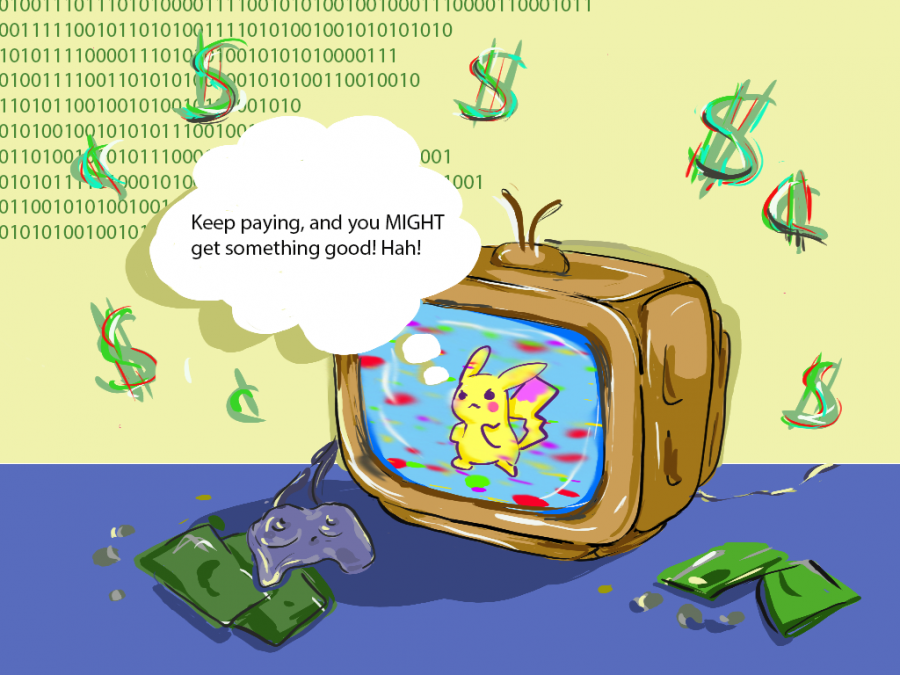Loot Boxes: the Surprise Epidemic in Present Youth
Video game companies have opted to create a gambling system directly targeting children
Video games such as Pokemon often feature gambling, a potentially dangerous trap for younger audiences.
Gambling. It is a staple in countless adult entertainment, from drinking to adult cartoons such as South Park and Simpsons, gambling fits in fairly well. However, the emphasis on the word “adult” has slowly started to fade away in recent years due to the numerous appearances of gambling in today’s youth “video-games”.
Some of the earliest cases of gambling in children’s “video-games” can be found in Pokémon, a role-playing adventure game where players take control of creatures known as Pokémon and use them to battle one another. In Pokémon’s first game, known as Pokémon Red and Blue Version, the games featured a slot machine section, where players play machines in exchange for in-game currency, which would then help buy Pokémon from the coin exchange. This is a staple in the games until the remakes of the third games in the series in 2015, known as Pokémon Omega Ruby and Alpha Sapphire, where they removed the lottery machines. The absence of the slot machines is a crackdown by European gambling laws in order to prevent encouraging gambling towards kids, the main audience of the Pokémon series. It is a good move for Pokémon to remove gambling mechanics because introducing something like that at an early age is usually how addictions occur, which is especially true for a growing mind such as a child.
That being said, gambling is still heavily prevalent in many other games, despite video game titan Pokémon, shutting it down. However, present times have strayed away from the classic lotto machine. Instead, many games feature a “loot box” mechanic, where players pay real-life money for enticing prizes such as in-game cosmetics, game bonuses, etc, but risk getting less desirable prizes (i.e. a low valued item in a game or one they have already obtained). Infamous cases include Electronic Art’s (EA) Fifa and Madden series, sports games that have gamers use real money to buy for a chance to get a desirable player and cosmetics.
Clash Royale is another game that heavily promotes loot boxes, by making it the centerpiece of the entire level-up system of its cards. Although Fifa, Madden and Clash Royale appeal to a younger audience, the companies behind them willingly and twistingly tempt kids into spending their money on a simple chance to succeed in the game. The monetization of in-game microtransactions is a dangerous way of introducing a bad habit to someone. This is an epidemic for the kids in the world, as gambling is not always a positive output for people in the world. It exploits the human psychological state, and teaches kids from an early age that gambling away all of your money is perfectly acceptable; trouble is, it is not. It teaches kids from an early age that gambling away all of your money is perfectly acceptable; trouble is, it is not. Gambling creates several issues, such as the unhealhy desire to continuously buy more boxes, creating a sense of greed, which isn’t healthy. Creating what is essentially a method for gambling specifically targeted towards kids is despicable. Companies are harming kids’ futures through effectively stealing the money from the young minds that just want their favorite character or cosmetic. One should realize that this epidemic should be stopped as it is. Make lootboxes illegal in childrens video games. Theyŕe not fun ¨surprise mechanics¨, they are just money printers.
Sources:
https://www.medicalnewstoday.com/articles/15929.php#diagnosis
https://statelaws.findlaw.com/california-law/california-gambling-laws.html
Your donation will support the student journalists of Woodbridge High School. Your contribution will allow us to purchase equipment and cover our annual website hosting costs.

Hey there fellow Warriors! I'm a staff writer for the Woodbridge High School Golden Arrow. I learned all my journalism skills here at this school and my...

Hello warriors! My name is Vivian and I’m really excited to spend the rest of this year as an illustrator in the Golden Arrow. I’m looking forward...









